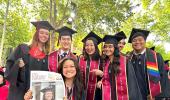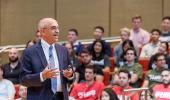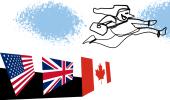Amidst growing panic over US President Donald Trump's ban on Harvard's international student enrolment, overseas education consultants have this advice for Indian students.

On May 22, 2025, the Trump administration revoked Harvard University's permission to enrol international students.
The US government cited various concerns, including the safety of Harvard's students, alleged antisemitism (discrimination against Jewish people) and unverified ties to the Chinese Communist party.
'I am writing to inform you that effective immediately, Harvard University's Student and Exchange Visitor Programme certification is revoked,' Homeland Security Secretary Kristi Noem said in a letter -- dated May 22 -- sent to the university.
'Existing aliens on F or J non-immigrant status must transfer to another university in order to maintain their non-immigrant status.'
The US F-1 visa is for students attending universities, colleges, high schools or language training programmes in the US. The J-1 visa is for exchange visitors, including students, researchers and professors who are participating in cultural exchange programmes.
This decision raises serious concerns about the legal status of thousands of international students, including 788 students from India.
As per the announcement, current international students studying at Harvard will need to transfer to other institutions or risk losing their legal status.
The Trump administration's decision to revoke Harvard's certification to enrol international students is a seismic shift in the US study abroad landscape, particularly for Indians who make up a significant portion of Harvard's international student base, Karan Gupta, an alumnus of the Harvard Business School and a global education expert, tells Divya Nair/Rediff.
What does the announcement mean for Indian students currently studying at Harvard?
How will their visa status, academic progress and future prospects be affected?
"Current Indian students on F-1 student visas are likely to face uncertainty," says Karan.
"Without the Student and Exchange Visitor Programme (SEVP) certification, Harvard cannot legally host international students. This could invalidate their visa status unless alternative arrangements are made quickly.
"It would also disrupt academic progress, especially for those in the middle of multi-year degree programmes.
"And finally, it would affect post-study work opportunities such as optional practical training (OPT)."
According to Ritika Gupta, founder, Aaera Consultants, the main concern will likely be how these changes affect visa status, job opportunities, OPT/curricular practical training (CPT) and their overall academic structure.
Dr Suchitra Surve, director, Growth Centre (I) Pvt Ltd, explains how the revoking of Harvard's SEVP certification visa ban can affect students' plans for further studies, work or settling in the US, adding a lot of stress and uncertainty to their future.
"They may not be able to take part in programmes like OPT and CPT, which help students get work experience in the US during or after their studies.
"Without these, it becomes harder to find a job and build a career there. Internships, research projects and exchange programmes may also get affected, which are important for learning and future opportunities.
"Many companies in the US prefer to hire students who already have the right visa so job opportunities may reduce. Students might also have to think about moving to other approved universities or even returning to their home country to finish their education."
How will the decertification affect prospective international students?
Can they still apply to Harvard or should they redirect their applications elsewhere?
"This move effectively bars all new international students from enrolling at Harvard until the certification is reinstated," warns Karan.
"As of now, Harvard is not allowed to issue new I-20 forms, which are essential for applying for an F-1 student visa. That means if the situation doesn't change, new international students won't be able to get a visa to attend Harvard," adds Dr Surve.
What should existing students at Harvard do?
"Current students can consult immigration attorneys immediately to understand their rights and obligations under US immigration law.
"Besides initiating transfer applications to maintain visa validity and educational continuity, students should coordinate closely with Harvard's designated school officials (DSOs) and international student support services," he adds.
If not Harvard, what are some of the other potential options students can consider?
"Prospective applicants should temporarily pause any plans to apply for the Fall 2025 intake at Harvard," says Karan.
He suggests aspirants redirect applications to peer institutions like Stanford, MIT, Yale, Princeton and Columbia, which remain SEVP-certified and globally reputed. However, he adds, that "with deadlines for Fall 2025 already gone, students may have to look at Fall 2026."
Dr Surve agrees with Karan, adding, "If not Harvard, students can also consider UC Berkeley, UCLA and the University of Chicago in the US."
"Outside the US," he adds, "top options include the University of Toronto and the University of British Columbia in Canada; Oxford and Cambridge in the UK; the University of Melbourne and the Australian National University in Australia; TU Munich and Heidelberg University in Germany; and the National University of Singapore and Nanyang Technological University in Singapore."
All three experts feel that students who are planning to study in the US should broaden their target list of universities.
"Indian students can apply to top universities in the UK and EU besides considering the top universities in the US. This unprecedented move underscores the volatile intersection of politics and higher education," says Karan.
Ritika, meanwhile, recommends a shortlist of leading international universities that students can consider.
"Imperial College London, ETH Zurich and the University of Toronto provide a comparably demanding academic setting along with dependable immigration choices.
"Additionally, universities in Europe, particularly in The Netherlands, Germany and Scandinavia, are increasingly becoming attractive options for students seeking quality education at affordable prices, along with job opportunities after graduation.
"Countries like Canada, known for its inclusive visa policies for students and a growing tech sector and Australia, celebrated for its emphasis on research and innovation, are emerging as top choices."
For international students who are planning to apply this year, Dr Surve offers a list of Dos and Don'ts:
1. Wait and watch: The application cycle for Fall 2026 begins in December, so there is time for more clarity.
2. Have backup options: Apply to other US universities and consider universities in India, Canada, the UK, Singapore, Australia and Europe.
3. Be flexible: Explore alternatives. Keep yourself updated on any legal developments.
4. Expand: Don't pause your application plans, just expand them to include more alternatives.
Amid the growing uncertainty in the US, particularly for Indian students and hassled parents, Karan also advises to look at the big picture: "Don't panic. Diversify. Harvard is an icon but it is not the only path to success. Education is about opportunity and, with strategic planning, students can thrive at numerous world-class institutions."
- Planning to study abroad? Post your questions to rediffGURUS HERE.











